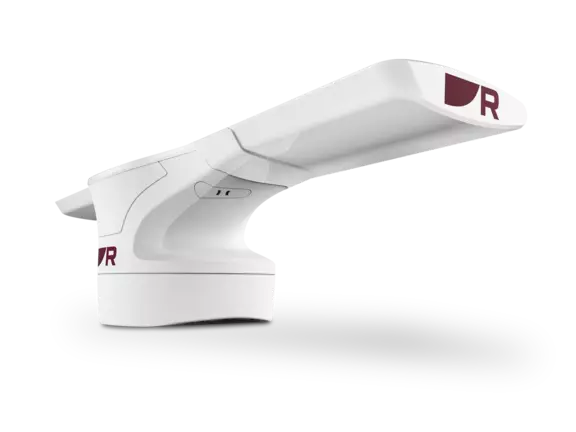110 Watt open array with CHIRP Pulse Compression technology. Available with your choice of a 3, 4, or 6-foot antenna array. This powerful 110-watt solid-state radar is equivalent to a 12kW magnetron radar, offering extended range performance up to 96 NM.


With a powerful 110-watt solid-state transmitter, Cyclone Pro delivers superior target separation and increased long-range resolution using CHIRP pulse compression and beam sharpening technology. The increased power output of Cyclone Pro is equivalent to a 12kW magnetron radar and gives Cyclone Pro a range of up to 96 nautical miles.
Cyclone Pro model features innovative detection capabilities, including Doppler target tracking, RangeFusion™ technology, Bird Mode and high-speed 60 rpm imaging.

Don't take our words for it, here's what the Pros say about the Raymarine Cyclone radar...
Choose Cyclone Pro in 3, 4, and 6-foot array options
| General | |
|---|---|
| Antenna Size | 3 / 4 / 6 Foot Array |
| Max Range Scale | 96 Nm |
| Rotation Speed | 12 / 24 / 36 / 48 / 60 rpm |
| Boot Up time | 40 seconds |
| Standby to Transmit | Less than 5 seconds |
| Power Connection | 1x Power connector |
| Data Connection | 1x RayNet connector |
| Transmitter Frequency | 9370, 9400, 9430 MHz (User Selectable) |
| Receiver Characteristic | Linear |
| Receiver Noise | Less than 5 dB |
| Power | |
|---|---|
| Peak Power Output | 110 W |
| Supply voltage (Using VCM100) | Nominal: 12 V dc or 24 V dc Minimum: 10.2 V dc Maximum: 31.2 V dc |
| Power Consumption (Typical) | 95 W |
| Power Consumption (Max) | 195 W |
| Power Consumption (Standby) | 30 W |
| Antenna / Beam | |
|---|---|
| Beamwidth (vertical) | 25° |
| Beamwidth (horizontal) | 2.83° |
| Polarization | Horizontal |
| Length | 1031 mm / 40.59 in |
| Weight | 7 Kg / 15.4 lb |
| Pedestal | |
|---|---|
| Dimensions | 388 mm x 360 mm x 335 mm / 15.27 in x 14.17 in x 13.18 in (to the top of the antenna) |
| Weight | 16 Kg |
| Environmental | |
|---|---|
| Waterproof Rating | IPX6 |
| Operating Temperature Range | -25°C to +55°C (-13°F to 131°F) |
| Humidity | Up to 93% at 40°C (104°F) |
| Maximum Wind Speed | 100 Kts |
| ARPA | |
|---|---|
| Target tracking | Tracking of 100 simultaneous ARPA targets. |
| Conformance | |
|---|---|
| Standards (Canada) | RSS138 Iss. 1, Technical Acceptance Certificate, Cyclone: IC:4069B-953LPSSR, Cyclone Pro: IC:4069B-953MPSSR |
| Standards (European Union & EFTA) | Radio Equipment Directive 2014/53/EU, Self-Declaration |
| Standards (Australia / New Zealand) | ACMA Declaration of Conformity, Compliance level 3 |
| Standards (USA) | 47CFR Part 80, Certificate of Approval, Cyclone: FCC ID: PJ5-953LPSSR, Cyclone Pro: FCC ID: PJ5-953MPSSR |
| Receiver | |
|---|---|
| Receiver characteristic | Linear |
| Receiver noise | Less than 5 dB |
| Physical (Antenna) | |
|---|---|
| Dimensions | 3 Foot Antenna Length: 1031 mm (40.5 inches) 4 Foot Antenna Length: 1336 mm (52.59 inches) 6 Foot Antenna Length: 1945mm (76.57 inches) |
| Weight | 3 Foot Antenna Weight: 7Kg (15.43lbs) 4 Foot Antenna Weight: 9Kg (19.84lns) 6 Foot Antenna Weight: 12Kg (26.45lbs) |
| Antenna | |
|---|---|
| Polarization | Horizontal |
| Beamwidth (vertical) | 25° |
| Rotation speed | 12 RPM / 24 RPM/ 36 RPM / 48 RPM/ 60 RPM |
| Beamwidth (horizontal) | 3 Foot Antenna:2.83° 4 Foot Antenna:1.99° 6 Foot Antenna1.32° |
| Transmitter | |
|---|---|
| Transmitter frequency | 9370, 9400, 9430 MHz (User Selectable) |
| Peak power output | 55 W |
| Peak power output | 110 W |
| Physical (Pedestal) | |
|---|---|
| Dimensions | 388 mm x 360 mm x 335 mm (to top of antenna) |
| Weight | 16 Kg |
| Connections | |
|---|---|
| Data connection | 1x RayNet connector |
| Power connection | 1x Power connector |
| Compatibility | |
|---|---|
| Axiom 2 XL - 16", 19", 22" and 24" models | Yes |
| Axiom 2 Pro - 9", 12" and 16" RVM and -S variants | Yes |
| Axiom+ - 7", 9" and 12" RV and chartplotter variants | Yes |
| Element - 7", 9" and 12" HV and -S variants | No |
| Axiom XL - 16", 19", 22" and 24" models | Yes |
| Axiom Pro - 9", 12" and 16" RVX and -S variants | Yes |
| Axiom - 7", 9" and 12" RV and chartplotter variants | Yes |
| gS-Series - gS95, gS125 and gS165 | No |
| e-Series - e7, e7D, e95, e97, e125, e127, e165 | No |
| eS-Series - eS95, eS97, eS98, eS125, eS127, eS128, eS165 | No |
| c-Series - c95, c97, c125, c127 | No |
| a-Series - a75, a77, a78, a95, a97, a98, a125, a127, a128 | No |
| E-Series Widescreen - E90W, E120W, E140W | No |
| C-Series Widescreen - C90W, C120W, C140W | No |
| G-Series Classic - GPM400 | No |
| E-Series Classic - E80, E120 | No |
| C-Series Classic - C70, C80, C120 | No 1 |
| Notes | 1 - C-Series Classic chartplotter displays are only compatible with analog radar scanners, discontinued. |
Find out more about the main differences between Open and Closed Array radar by reading our online guide here.
Cyclone radars transmit with 55-Watts of power output, while Cyclone Pro models transmit with 100-Watts of power. The additional power output of the Cyclone Pro will allow it to better detect smaller and weaker targets in poor conditions and detect long-range targets earlier and with stronger/brighter returns.
Marine radars use the length of their antenna array like a lens to focus the outgoing radar beam. The more tightly the radar’s microwave energy is focused, the more detail it returns. The antenna beamwidth is 2.83° for the 3-foot, 1.99° for the 4-foot, and 1.32° for the 6-foot antenna. The length of the antenna also changes the gain (sensitivity) of the scanner for hearing weak echoes coming back. Longer antennas have more surface area, and thus higher sensitivity.
The Cyclone and Cyclone Pro radars have a maximum theoretical range of 96 miles. The actual range at which you will be able to detect targets will vary depending on the height of your radar scanner above the waterline, and the height of the target being detected.
All radars transmit electromagnetic energy at microwave frequencies which can be harmful, particularly to the eyes. For safety, we recommend that any radar be installed above head height, out of range of personnel and passengers.
Radar scanners should be mounted as high as practical above the waterline. Radar operates as a line-of-sight device, so a high mounting position will give better long-range performance. The radar is also best mounted above the head-level of crew and passengers, to avoid mechanical danger and minimize exposure to electromagnetic radiation.
The requirements for installation and operation of Raymarine radars may be subject to individual licensing of the equipment, operator, or vessel. You are strongly encouraged to check with the requirements of the licensing authority of your national administration. Your local Raymarine dealer can also advise on local and national licensing requirements.
Raymarine radars are ideal for use on rivers and inland waterways due to their excellent long and short-range target detection characteristics. The radar scope can also be presented in a heading-up presentation with a 1/3 or 2/3 offset that gives the radar operator maximum look-ahead visibility in these kinds of waterways.
In most cases, installing a new radar scanner will require the change-out of the radar scanner interconnect cable but there are exceptions to this. For example, Raymarine offers an adapter cable (A80308) that allows a Quantum or Quantum 2 radar to use the interconnect cable from any Digital or HD Digital radar scanner. Other options may be available. Please consult with your Raymarine installer or technical support for options.
In most cases new Raymarine scanners will fit on mounts that previously held another Raymarine radar scanner. The mounting pattern for radar scanners has been standardized for many years. There may be mechanical exceptions to this if changing from a radome-style scanner to an open-array due to the larger physical size and weight.
Raymarine radars are excellent tools for monitoring the weather. They can readily detect rain squalls, thunderstorms, and other atmospheric precipitation at long distances. Detecting and tracking weather at long distances can enable you to avoid harsh weather and make your time on the water safer and more enjoyable.
Radome-style radar scanners are often mounted to a sailboats main mast or foremast using a specially designed mast mount. The mount is typically rivited or bolted to the mast and offers a secure mounting point with excellent line-of-sight for the radar to operate. Optional guards are normally available to provide extra protection to the scanner from the impact of sails or rigging, if needed. These mounts are offered by Raymarine and from 3rd parties like Edson, Questus, ScanStrut, and SeaView.
Raymarine radar scanners come with a standard 2-year warranty covering both parts and labour. If you register your newly purchased radar on Raymarine.com within 90 days purchase your warranty coverage is extended to 3 years at no additional cost.
Most marine radar scanners are intended to be used with chartplotters or multifunction displays from the same manufacturer, with some small exceptions. Raymarine’s Quantum radar is compatible with the Orca Core 2 navigation system, as well as the The Q Experience Q2 Display.

The following parts are supplied with the Cyclone Pro radar.
| 1 | Radar pedestal |
| 2 | M10 stud x 4 |
| 3 | M10 nut x 8 |
| 4 | M10 spring washer x 4 |
| 5 | M10 plain washer x 4 |
| 6 | Cable gasket |
| 7 | Radar Antenna |
| 8 | M8 Hex Bolt x4 |
| 9 | M8 Plain Washer x 4 |
| 10 | M8 Spring Washer x 4 |
| 11 | O Ring x 4 |
| 12 | RayNet data cable |
| 13 | Power cable |
| 14 | Denso paste |
| 15 | Documentation pack |
| Manual | |
|---|---|
| Download Manual | Download Cyclone Pro radar manuals, declarations of conformity and mounting templates. |
| Software | |
|---|---|
| Download Software | Download the latest software for your Raymarine Cyclone Pro radar. |



